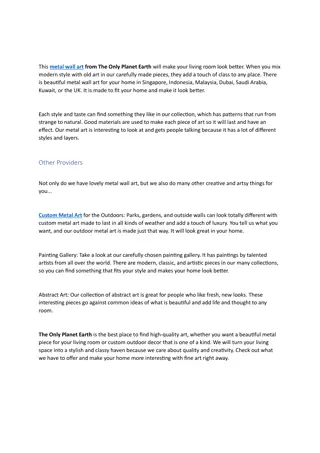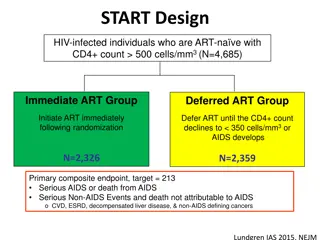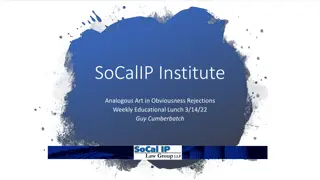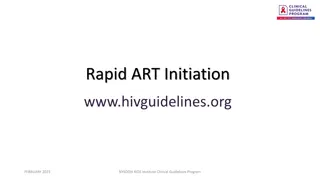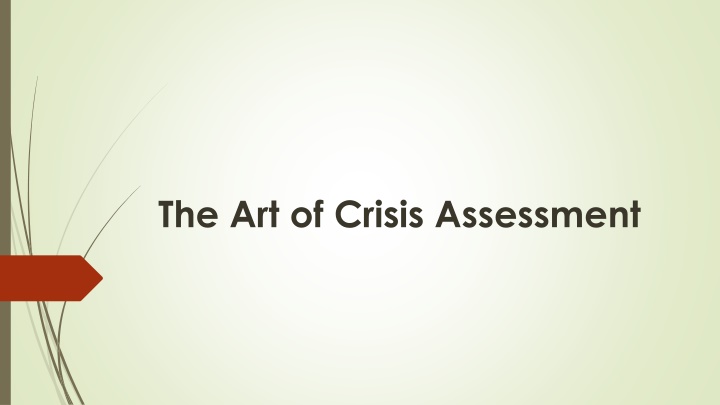
Effective Crisis Communication and Support Strategies
Learn how to assess, communicate, and build rapport in crisis situations. Understand the importance of validation and active listening techniques. Prepare to talk to individuals in crisis with empathy and understanding. Enhance your communication skills to support those in need effectively.
Download Presentation

Please find below an Image/Link to download the presentation.
The content on the website is provided AS IS for your information and personal use only. It may not be sold, licensed, or shared on other websites without obtaining consent from the author. If you encounter any issues during the download, it is possible that the publisher has removed the file from their server.
You are allowed to download the files provided on this website for personal or commercial use, subject to the condition that they are used lawfully. All files are the property of their respective owners.
The content on the website is provided AS IS for your information and personal use only. It may not be sold, licensed, or shared on other websites without obtaining consent from the author.
E N D
Presentation Transcript
Communication Skills in Crisis Situations
Preparing to Talk a Person In Crisis Be prepared to hear things that are not comfortable to hear Know your triggers Be open and not judgmental Stay crisis focused this is not therapy What is the person in crisis view point of the crisis-what would they like to see happen? DO NOT MAKE ANY PROMISES
Building Rapport Treat the person with respect, even if you do not understand some of the things her or she does or says Be as supportive, accepting and as positive as you can and value the person s perspective and input Engage the person in casual conversation or activities with which you and they are comfortable m, clear, direct, and brief in your communication
Validation Validation is a way to let people know that their feelings/actions/thoughts make sense given what they have experienced in life Validation is about letting others know you hear them and understand what they are trying to communicate. Validation does not equal agreement Try to avoid the "buts" - when you add a but you are negating what you said. Wow that does seem hard, but you should have better coping skills"
Active Listening Active listening involves observing and interpreting verbal and nonverbal conversation while an individual is speaking
Active Listening This is a structured way of listening and responding while focusing intently on the speaker, which can be assisted by suspending immediate reference and judgment upon what is being said: Observing and interpreting verbal and nonverbal conversation while an individual is speaking Give undivided attention, use silence Using different questioning techniques Examples: Leaning in, Uh-huh s, Rephrasing , Asking questions, Clarifying, etc.
Active Listening By actively listening to a person s story, the responder will hopefully accomplish the following with the individual: validate their concerns, emotions, and reactions; offer perspective from your objective viewpoint; provide hope and a sense of direction; identify resources they may have forgotten about or do not know exist help alleviate the current crisis
Active Listening Ask open ended questions How do you feel about that? Could you tell me more about that? Reflection It seems to me that you re saying you felt sad and lonely when Restate what you have been told in simple terms. Empathy -the listener's effort to hear the other person accurately and non-judgmentally I understand. That sounds like a very difficult situation.
Active Listening https://www.youtube.com/watch?v=aP55nA8fQ9I
Empathy the ability to understand and share the feelings of another the listener's effort to hear the other person accurately and non- judgmentally Is not sympathy It is important to not downplay the persons feelings by inserting examples of other /your situations-this could also be a ethical dilemma
Cultural Awareness There is an awareness in the field of crisis that race, ethnicity, and culture affect the way in which an individual responds to and copes with crisis. For this reason it is important that you, as a crisis worker, recognize that sensitivity to cultural differences is essential in providing mental health services to those in crisis. Human sexuality, race, ethnicity, cultural and spiritual values are all aspects of cultural competence and awareness.
De-escalation What is it? Intervention aimed at lowering anxiety Combination of methods to demonstrate care, confidence and concern What you say and how you say it
De-escalation Remain as calm as you can; talk slowly and clearly Do not approach or touch the person without his or her request or permission to do so. Allow the person an avenue of escape. Do not discount grievances just because you happen to disagree. Validate feelings even if you can not agree on the issue at hand. Do not argue irrational ideas Acknowledge the person s feeling and express your willingness to try to understand what the person is experiencing
De-escalation Respect Personal Space maintain at least an arm's-length distance from a person whose behavior is escalating Be Aware of Your Own Body Position avoid eye-to-eye, toe-to-toe positions, as they might be interpreted as challenging Standing at an angle to the person and off to the side is much less likely to escalate an agitated person's behavior Stay Composed, Avoid Overreacting angry people often say very personal things. But it is essential to do your best to remain calm and professional. Your composed, rational response can go a long way toward influencing the person's behavior in a positive way.
De-escalation If a person is yelling or talking loudly, use a quiet voice in response If a person is talking rapidly, talk more slowly Remember if angry or insulting comments are directed at you, they are not about you. Refocus on the client and their needs
De-escalation with someone who is angry What makes you angry? Not being listened to Being threatened Being frustrated What makes you less angry? Having someone on your side Feeling listened to Have something happen soon
Behavior/Emotion Communication/Response Considerations Stay calm, accepting, use non threatening voice/gestures Initiate conversation and contact Fear, Insecurity Withdrawal Difficulty concentrating Be brief; repeat important information Over stimulation Limit input; don t force discussion Fluctuating emotions Don t take words or actions personally Fluctuating plans Stick to one plan Poor judgment Don t expect rational discussion Be simple and straight forward Confusion about what is real Preoccupation with internal world Agitation Get attention first Recognize agitation and allow the person an exit Stay positive and respectful Little empathy for others
Self-Protection: Be Aware of your Surroundings Where are you? Where is the consumer? For example: are you in the kitchen where knives are readily accessible? Exit plan Response of others in the area What in the room could be a weapon
De-escalation https://www.youtube.com/watch?v=-lYCwQ88-LE
Responding to Psychotic Individuals
Responding to Individuals Experiencing Psychosis Don t try and figure out the hallucination/delusion Do not question or discuss the details of delusional statements in any depth. Don t try to convince or argue a person out of a delusion
Crisis Assessment and Collaboration- Who do you talk to? The client Guardian- parent/ legal Supports- family, friends etc. Law Enforcement Crisis Staff Other facilities: Hospital, Group home, Nursing home etc. Jail Others? Entrance and Exit Interviewing Ask each person what they would like to see happen today
THIS SLIDE IN CONSTRUCTION INSERT CIRCLE OF ASSESMENT HERE See Jill V email
Client Collaboration- Perception of the situation Desired Outcome THIS SLIDE INCOMPLETE
Client Collaboration-Strengths Strengths: insight into current situation/ status healthy hobbies/ interests/ coping skills cooperative when talking with you, are they asking for help, do they seem honest throughout the interview? did they give up things they could or have harmed themselves with? how have they managed to cope in the past?
When to engage clinical consultation If you encounter a situation that is more unusual, complex or higher risk and you would like to problem solve, seek guidance, or achieve concurrence on your plan. When your concerns/questions are related to clinical assessment, diagnosis, risk levels, or safety planning. If there is disagreement between crisis staff and collateral parties that is related to the assessment of the crisis.
When to engage clinical consultation Upon employment with NWCGC/NWC it is expected that the crisis worker will utilize the clinical line for a minimum of the first five calls. Due to the independent nature of crisis work this allows for judgment to be monitored and support to be established. Seeking clinical consultation when needed can improve the overall assessment process, share liability, and increase your confidence as a crisis worker
Clinical Consultation An outside person can be more objective and help problem solve. Research shows those who work in a team do better than individually. Never worry alone!
Ethics and Boundaries In Crisis Situations
Scope of Practice In crisis work your scope of practice is crisis work. Your role is to gather data associated with the situation, collaborate with parties and make a least restrictive determination of need. Regardless of your degree, field, or practice this is the scope you must stay within when working as a crisis worker.
How Much Tylenol is too much Tylenol John is a 12 year old male who weighs 100 lbs. He has consumed approximately 8-10 Tylenol. Given his age and weight will John need his stomach pumped or will poison control need to be called?
Ethics Don t make promises you cannot keep(appts, ongoing tx , etc.) Mandated Reporting Confidentiality
Boundaries Self disclosure Meeting outside of your role Utilization of social media Conflict of Interest/Dual Role
You are important in this too.. Determining, creating and maintaining boundaries is important in any role, especially crisis work. It is important to remember that you have personal responsibility related to your safety. Keep your supervisor updated on unusual incidents and/ or concerns related to safety (yours or others).
Importance of Self Care Self Care/Wellness Assessment Going around the room identify one thing you do daily to care for yourself.




